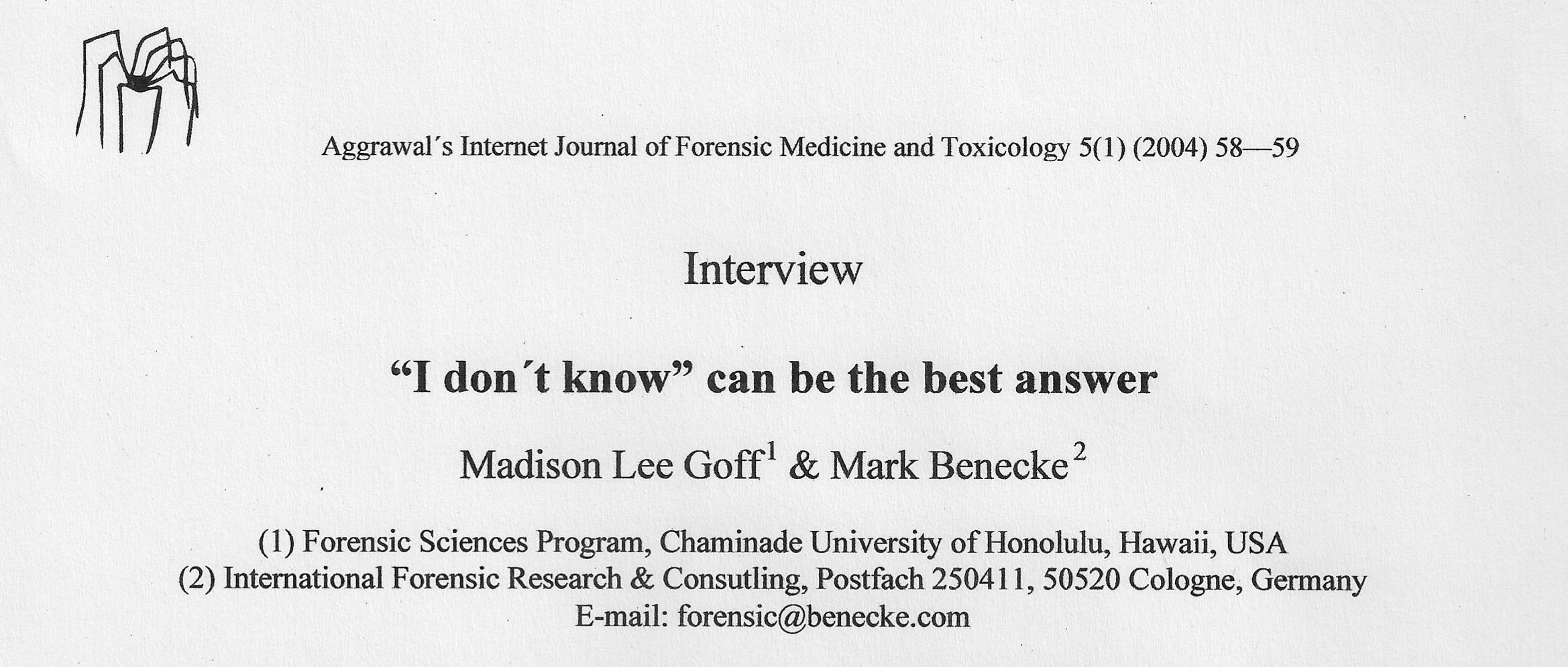Source: Forensic Entomology Special Issue: Anil Aggrawal's Internet Journal of Forensic Medicine and Toxicology, January 2004, ISBN: 0972-8074
Editor: Mark Benecke
Main Reviewer: Jeff Wells
Edition: Forensic Entomology Special Issue
Publisher: Anil Aggrawal's Journal of Forensic Medicine and Pathology
Editor: Dr Mark Benecke
Project: Forensic Entomology
Full Issue (klick)
Mark and Lee at the FBI Academy in Quantico at a Forensic Entomology Training
Mark Benecke: From your experience, which type of person will enjoy forensic entomology as a profession(al career)?
Lee Goff: Based on my experiences, an individual wanting to work in forensic sciences in general has to be a little strange. We go to situations that most people avoid. You must be able to distance yourself from the situation and view the evidence as evidence, not becoming emotionally involved. You need to remain objective. You are looking for the truth of the situation and that is not as variable as lawyers would lead you to believe. You need to be someone who enjoys puzzles and does not want life to be routine. If you want a 9 to 5 job, this is not for you. Life can be much like having Christmas every morning. You never know what will be waiting for you. You need to be a little nosey and not accept the easy answers all of the time. You also need to remember that sometimes things are exactly what they appear to be. Develop a sense of humor. You'll need it.
M.B: Which of your own papers do you like best?
L.G.: Actually my favorite paper would be the book I wrote: A Fly for the Prosecution. Primarily because I got to insert a little of myself into the situations. More that the publishers might have wanted but less than I started with. Past that my first paper A short note on distributions of chigger mites on islands in the North Central Pacific. Not earth shattering, but I'm still amazed that I actually had nerve enough to write it, given my position as a technician in the Entomology Department at the Bishop Museum at the time.
M.B.: Was there any scientific paper or observation that made your mind blow?
L.G.: In retrospect, I was fascinated by S. J. Gould's work on the ideas on evolution. Can't say they changed my existence, but they stared me thinking in different ways. Past that, I had some wonderful conversations with him.
M.B.: How did you manage to get your family, especially your daugther, enthusiastic about forensics?
L.G.: My family is amazingly tolerant of my activities. Before I became interested in forensics, I worked on ectoparasitic mites. This meant trips to catch and skin rodents and other small mammals, collection of amphibians and reptiles. My wife went with me and helped in these projects. Forensics may have actually been a relief. I don't keep those specimens in the freezer at home. My daughters grew up with my research. They went with me to visit the decomposition studies and based school projects on some of these. I never pushed what I do on their futures. One has decided she enjoys it and is now working on her graduate degrees in forensic anthropology. The other has gone into communications and education, working with a pre-headstart program aimed at low income/recent immigrant families here in Hawaii. I'm very proud of both.
M.B.: In one sentence, what is your basic guideline for forensic entomologists?
L.G.: Follow the evidence and be objective in your analyses.
M.B.: Anything else?
L.G.: One of the major problems I have seen recently is in entomologists inflating their roles in the investigation. Too often I see individuals forgetting they are scientists and not law enforcement. One should provide testimony only with one's own area of expertise and be certain not to extend opinions past the limits of the available evidence. Deviations from this do not serve the legal system or justice. Sometimes, in fact quite often, "I don't know" is the best answer in the world.
M.B.: Thanks, Lee.
L.G.: Aloha.







